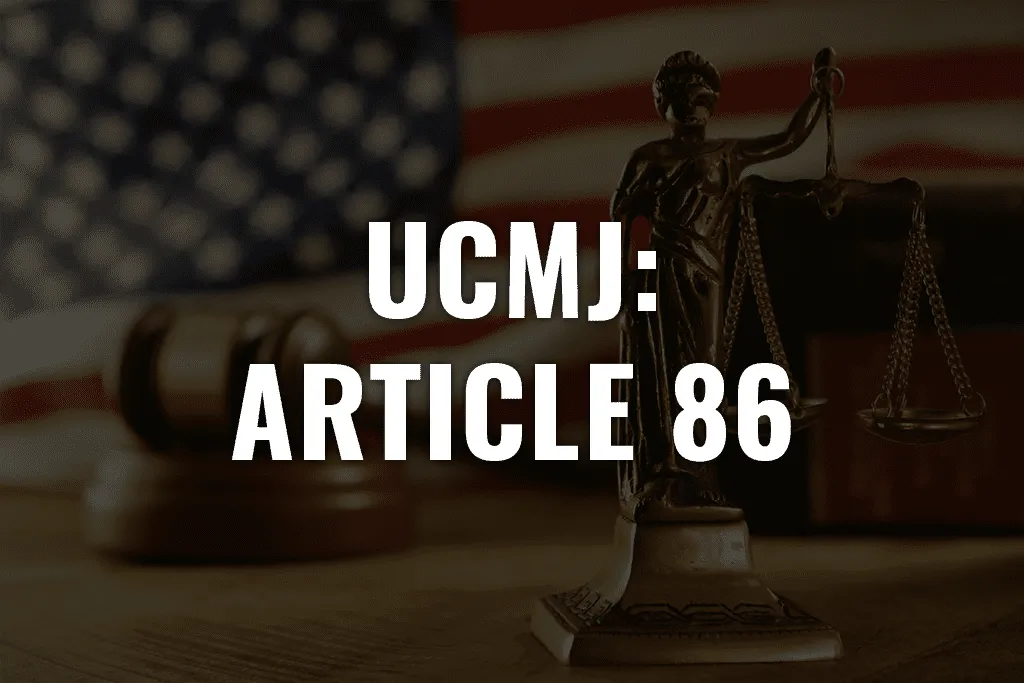The United States military operates on a foundation of discipline, accountability, and readiness. Every service member is expected to fulfill their duties and report to their assigned stations on time. When that expectation is broken, the consequences can be severe. Article 86 UCMJ addresses Absence Without Leave (AWOL), a violation that threatens the effectiveness of military units and undermines trust in the chain of command.
What is Article 86 UCMJ?
Article 86 UCMJ makes it unlawful for a service member to be absent from their place of duty without permission. Unlike civilian jobs, where missing work may result in reprimands or termination, unauthorized absences in the military are criminal offenses that can lead to significant punishment.
This rule is essential because the absence of one service member can endanger missions, burden fellow soldiers, and compromise national security. The military relies on every individual to be present and prepared, and AWOL undermines that commitment.
Types of Violations Under Article 86
Article 86 covers several forms of unauthorized absence:
- Failure to go to appointed place of duty – Missing formation, guard duty, or another scheduled task.
- Going from appointed place of duty – Leaving a post or assigned station without proper authority.
- Absence from unit, organization, or duty station – Not being with one’s unit at the required time and place.
- Prolonged AWOL – Absences lasting days, weeks, or more, which may escalate into desertion if the intent to permanently abandon service is proven.
These violations can occur in a variety of circumstances, but the unifying factor is the lack of authorization for the absence.
Consequences of Violating Article 86 UCMJ
The punishment for AWOL under Article 86 UCMJ depends on the length of the absence and the circumstances surrounding it. Penalties may include:

- Restriction or extra duty for minor absences.
- Forfeiture of pay and allowances.
- Reduction in rank.
- Confinement for extended or repeated violations.
- Dishonorable or bad-conduct discharge in severe cases.
The military considers whether the absence negatively affected the unit or mission. For example, a soldier missing a deployment or critical operation will face far harsher consequences than one late to morning formation.
Why Accountability Matters
The U.S. military cannot function effectively without discipline and reliability. Each member plays a role in ensuring the success and safety of missions. When a service member goes AWOL, others must fill the gap, increasing stress and workload while jeopardizing cohesion.
Article 86 UCMJ ensures accountability by holding individuals responsible for their presence and duty. It is not just about punishment; it reinforces the values of commitment, reliability, and teamwork that define military service.
Possible Defenses to Article 86 Charges
While AWOL is taken seriously, there are situations where defenses may apply. Common defenses include:
- Lack of knowledge of the duty requirement.
- Medical emergencies or incapacitation.
- Administrative errors in duty rosters or orders.
- Miscommunication about authorized leave or absences.
Each case is fact-specific, and outcomes vary. A skilled military defense attorney can help service members present valid defenses and protect their rights.
Conclusion
Article 86 UCMJ is one of the most important provisions in military law, addressing unauthorized absences and ensuring service members remain accountable. Absence Without Leave disrupts discipline, threatens missions, and undermines trust in the chain of command. For this reason, AWOL is punished firmly to preserve the integrity of the armed forces.
